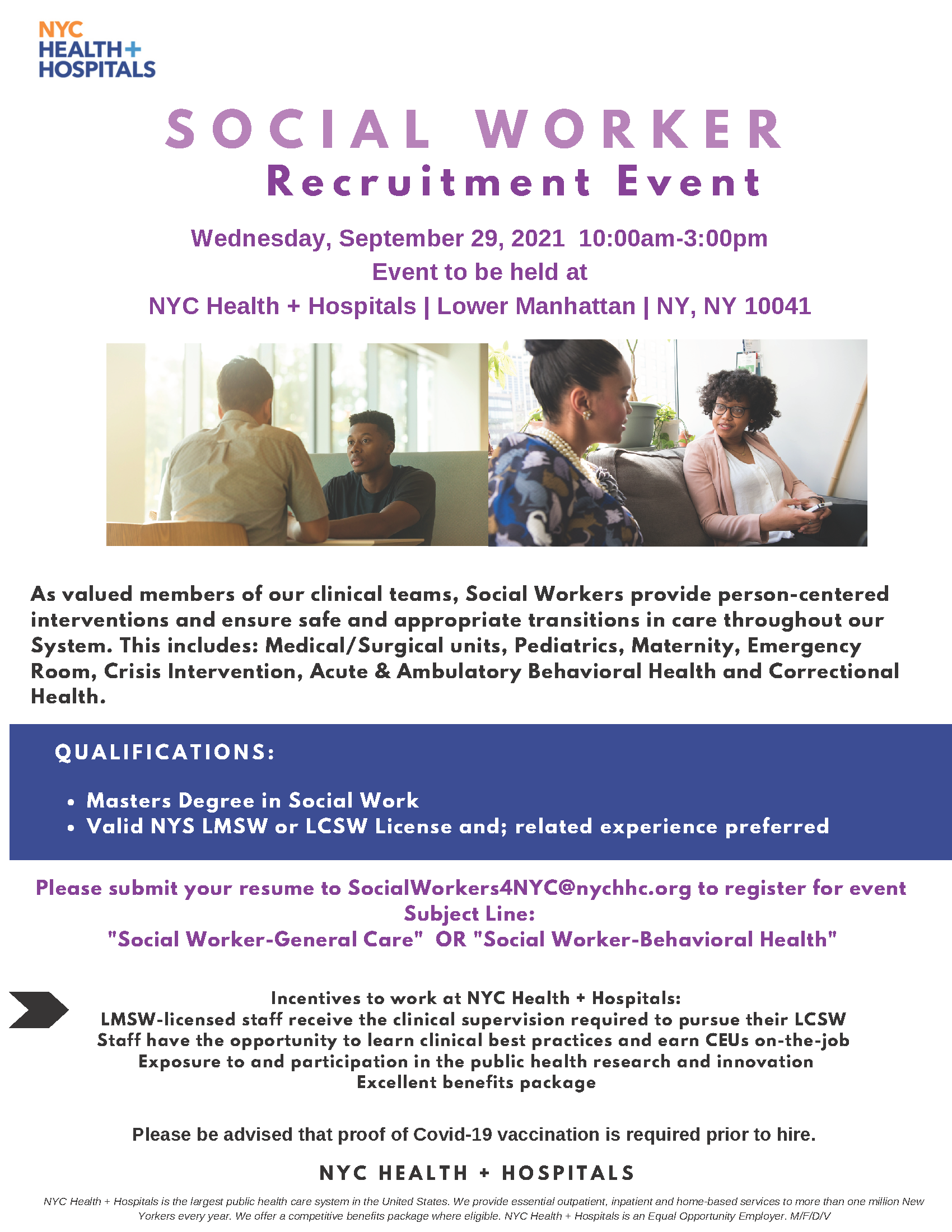U.S. Public Health Service Commissioned Corps Social Work Careers | Wednesday, January 26
NASW-NYC CARES Virtual Social Work Job Fair
Tips for First-Generation Job Seekers
 In honor of First-Generation College Student Day celebrated yesterday, we would like to a give special shout-out to our first-generation students and alumni who are continuing to blaze a trail for themselves, their families, and communities and making their mark in the field of social work!
In honor of First-Generation College Student Day celebrated yesterday, we would like to a give special shout-out to our first-generation students and alumni who are continuing to blaze a trail for themselves, their families, and communities and making their mark in the field of social work!
If you are currently pursuing opportunities as early career professionals or seeking to advance to leadership roles, here are a few tips to keep in mind.
-
- Know that you have a lot to offer. Start by embracing the knowledge and strengths you’ve built. Your resourcefulness, determination to succeed, and ability to both navigate uncertainty and complex systems and adapt to changing needs are all qualities that employers highly value. Keep a record of your unique skills and accomplishments and practice sharing them with others so you can feel confident conveying them to prospective employers.
- Build a support system. A healthy support system can offer validation and a safe space to bounce off ideas and concerns. Continue investing time in developing your trusted community of mentors, professionals, former supervisors, peers, faculty, and college administrators who can share resources, information, and potential access to opportunities. To find community on campus, check out the events hosted by the Graduate Initiative through University Life and reach out to the student leaders of the CSSW’s First Generation Lower SES Caucus.
- Be proactive in seeking resources. Continue to use resources inside and outside of Columbia to increase your knowledge around job searching, networking, negotiating salary, and advancing in the workforce. For instance, you can learn about the unspoken rules of the workplace and how to get ahead in your career from this HBR IdeaCast episode, Career Rules You Didn’t Learn in School, take a self-paced salary negotiation program with AAUW online, or attend the National Urban League’s professional development webinars. You can also participate in networking and leadership development activities through professional organizations such as the Network for Social Work Management. Links to similar resources are also readily featured in our enews, blog, and Career Connect resource library.
Students and alums are always welcome to meet with us for individual career consultations. Learn more about what’s available to you here.
Good Shepherd Services Virtual Career Fair | Thursday, November 4
Good Shepherd Services is hosting a Virtual Information Session and Career Fair on Thursday, November 4, 2021, from 12:00 – 3:00 PM ET with a strong focus on Social Work careers.
Meet with Social Workers from different program areas (Foster Care, Prevention, Domestic Violence, Residential and School based programs), hear how their work impacts NYC communities, get a glimpse into a day-in-the-life of various roles, and find out what career tracks are available to you.
Those from all experience levels are invited to join.
Register here: https://tinyurl.com/xbcfuz5s
Michelle Rojas ’18 Shares Tips on Transitioning to the Corporate World
 Last week, we had the pleasure of chatting with Michelle Rojas ’18 about her current role as the Diversity, Equity, and Inclusion Manager at Imperfect Foods, her path transitioning to the corporate space, and strategies for entering similar fields.
Last week, we had the pleasure of chatting with Michelle Rojas ’18 about her current role as the Diversity, Equity, and Inclusion Manager at Imperfect Foods, her path transitioning to the corporate space, and strategies for entering similar fields.
If you missed it, here are a few takeaways:
-
- Do your research: Talk to people in roles and industries you’re interested in, and learn about what they do, what knowledge and skills are needed, and how they discuss their work and impact.
- Know your value: Take a deeper look into the skills you already possess from your program, field placement, and current and past experience. Identify those that are transferable, especially ones that are relational, programmatic, and macro-focused. Recognize strengths you also bring that professionals from other sectors may not, such as your human-centered, equity-focused training and lens.
- Learn how to communicate your social work story: Translate your background and experience in a way that others can understand. Use universal terms such as “cultivating relationships” or “creating plans to address needs and issues” versus social work specific language like “conducting clinical and case management work”. Make sure to highlight the impact of your actions in concrete, quantifiable terms.
- Curate your own path: Don’t wait for opportunities to come to you; forge your own path by seeking out opportunities and educational experiences inside and outside CSSW that will help you build the knowledge, skills, and connections you need to lead the work you aspire to do. As Michelle highlighted, “Social workers should be everywhere where decisions are made.” But it’ll be up to you to venture outside of the familiar social work world and direct your journey.
For more tips and insights, follow the Corporate Social Work Collective she co-founded, as well as their LinkedIn page.
4th Annual Communities of Color Virtual Networking Event | Thursday, October 28

The offices of Career Services and Leadership Management; Development and Alumni Relations; and Diversity, Equity, and Inclusion are pleased to invite students to our 4th Annual Communities of Color Virtual Networking Event on Thursday, October 28.
All those who identify as students of color/BIPOC (Black, Indigenous, and People of Color) are encouraged to participate!
This is a great opportunity to meet and mingle with a group of distinguished alumni of color, learn about their career paths and trajectories, and get tips and advice on navigating your own path as a professional of color in a dedicated virtual support space.
The list of featured alumni can be found below.
Event Details
Thursday, October 28
6:30 – 8:00 pm ET
Platform: Zoom
Pre-registration is required.
Sign up here using your LionMail account by Tuesday, October 26. We ask that you only register if you are able to attend.
FEATURED ALUMNI
-
- Noel Altaha ’16 – Senior Program Manager, Center for Court Innovation
- Priscilla Chen ’08 – Assistant Director of Counseling, Integration Charter Schools
- Sidney Delince ’19 – Quality Resource Manager, YAI / Psychotherapist, Gender and Sexuality Therapy Center
- Aliya Donn ’16 – Consultant/Cybersecurity Analyst, Security Risk Advisors
- Shanequa Moore ’10 – Founder & CEO, I’RAISE
- Kirk Royster ’14 – Director, Operations, Bowery Residents’ Committee
- Jasmin Tobar ’16 – Education and Mentorship Programs Manager, The Salvadoran American Leadership and Education Fund
- Pablo Venturino ’16 – Associate Director, Workforce Development, DC Government
Read more about our participating alumni.
NYC Health + Hospitals Social Worker Recruitment Event | Wednesday, September 29
Networking with Professors
 As highlighted in an article by Live Career, “learning how to connect with your peers, professors, and community is crucial for both personal and professional development”.
As highlighted in an article by Live Career, “learning how to connect with your peers, professors, and community is crucial for both personal and professional development”.
Professors, in particular, are invaluable resources from whom you can learn more about different areas of interest and opportunities within the field.
Wondering how to best connect with them beyond the classroom? Here are a few tips to keep in mind, whether you’re just starting the program or continuing:
-
- Research your professors to get a better sense of their background, interests, and achievements
- When reaching out to schedule a meeting, provide a very brief overview of your goals and interests and why you want to meet (e.g. what you hope to learn)
- Make the most of the time you have with them by coming prepared with targeted questions
- In all your interactions, whether virtual or in-person, be open, sincere, and mindful of how you communicate
- Ask for feedback and keep them updated on any developments, especially if you’ve followed through on any advice they gave you
Professors will likely be more receptive to your outreach while you’re a student, so be sure to take advantage of the opportunity before you graduate. This also applies to building relationships with peers, supervisors, and administrators. Investing in this effort will not only help you stand out and stay memorable, but it can also potentially open doors for years to come!
Building Your Career Path
 Whether you’re just starting out in your career or thinking about making a move, following a plan will help you move forward and help you get to where you want to be. This article by the Wall Street Journal offers 3 easy steps to help you get started with forging your career path:
Whether you’re just starting out in your career or thinking about making a move, following a plan will help you move forward and help you get to where you want to be. This article by the Wall Street Journal offers 3 easy steps to help you get started with forging your career path:
-
- Engage in self-reflective activities to help identify your core values and strengths – consider what lifestyle is most important to you, what attributes have remained constant, and what expertise you’ve developed over the course of your academic and professional life
-
- Seek trusted advice from mentors and professionals in your field to learn from their career paths, discuss your career goals, and/or tap into their professional expertise to learn about the industry
-
- Identify and develop the key skills and knowledge most in-demand within the areas you are interested in and be able to articulate how you can contribute to potential employers
Still need advice on how to get started? Schedule an appointment to meet with a career advisor or check out the career guides and resources posted in our Document Library within Career Connect.







